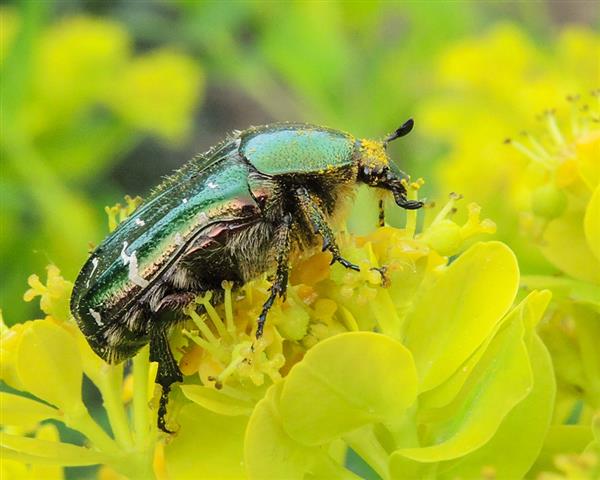Engerlingen

Engerlingen zijn de larven van kevers en onder het gazon kunnen ze een echte plaag zijn voor tuinliefhebbers, met name als je van groen egaal gras houdt. Ze zijn niet alleen onooglijk, maar ze kunnen ook ernstige schade toebrengen aan jouw gazon. Het goede nieuws is dat er biologische nematoden (aaltjes) zijn om de emelten biologisch te bestrijden. Op deze pagina bespreken we hoe je engerlingen herkent, van welke keversoorten ze afkomstig zijn en natuurlijk hoe je ze kunt bestrijden en voorkomen met Heterorhabditis bacteriophora aaltjes.
Hoe zien engerlingen er uit?
Engerlingen zijn witte C-vormige keverlarven (familie bladsprietkevers) die ongeveer een halve centimeter tot 4 cm lang worden. Deze gazonlarven hebben een zacht lichaam met poten bij het hoofd. In juni tot en met september voeden ze zich met de wortels van het gras en organisch materiaal in de grond. Hierdoor worden stukken in het gras en andere gewassen aangetast. De engerlingen veranderen uiteindelijk in volwassen kevers en komen uit de grond om vervolgens te gaan paren en eieren te leggen, die weer uitkomen tot larven. We spreken van een plaag bij meer dan 10 larven per vierkante meter.
Wanneer zijn het engerlingen?
Engerlingen in het gazon die groter zijn dan 3 centimeter zijn nagenoeg altijd engerlingen van de meikever of neushoornkever. Daarnaast is er de mestkever, deze is aanwezig tussen november tot april en heeft een lengte van ongeveer 2 centimeter. Larven die kleiner zijn dan 2 cm, zijn meestal afkomstig van de junikever of rozenkever.
De bestrijding van engerlingen vindt tegenwoordig uitsluitend plaats met biologische bestrijdingsmiddelen. Dit middel wordt in de volksmond vaak aaltje genoemd, maar in de professionele markt spreekt men over nematoden. De periode waarin deze aaltjes effectief zijn, is doorgaans het voor- en najaar. In deze tijd van het jaar zijn de larven van de kevers het kleinst en daarom nog het best te bestrijden met nematoden. Hieronder een kort overzicht van de verschillende keversoorten die zorgen voor emelten en dus schade aan het gras:
De meikever

De meikever heet officieel Melolontha Melolontha en is één van de bekendste keversoorten. Ze leggen eitjes in het voor en najaar. Deze eitjes ontwikkel zich uiteindelijk tot larven van de meikever, engerlingen dus, en voeden zich o.a. met de wortels van gras. Omdat dit zo’n bekende keversoort is en vaak wordt geassocieerd met engerlingen hebben wij er een complete pagina over geschreven, deze vind je op de op deze pagina Meikever .
De Junikever

De junikever heet officieel Amphimallon solstitiale en is net zoals de Meikever een bekende soort in Nederland. Ze veroorzaken dezelfde schade als de Meikevers door het leggen van eitjes wat later engerlingen worden. Ze komen alleen zoals de naam doet vermoeden, met name in de maand juni voor. Ook voor deze keversoort hebben we een aparte pagina geschreven, Junikever .
De Coloradokever

De Coloradokever, officieel: Leptinotarsa decemlineata is zoals hierboven te zien een prachtige verschijning. Maar kan ook net als de mei en junikever veel schade veroorzaken. De Coloradokever heeft het met name gemunt op aardappel, aubergines en tomaten. Warme zomers zijn gunstig voor de Coloradokever, ze kunnen dan wel 3 generaties eitjes leggen wat later engerlingen worden. Meer informatie vind je op deze pagina: Coloradokever.
De Rozenkever / Johanneskever

Ook de Rozenkever/Johanneskever, met de officiële benaming Phyllopertha horticola is een mooi insect, maar helaas kan deze keversoort ook veel schade veroorzaken en dit komt ook weer door de engerling. En de Rozenkever bestrijden zou je eigenlijk preventief moeten doen omdat de eerste twee larven stadia nauwelijks schade toebrengen. In het derde stadia veranderd dat abrupt en ontstaat er snel schade aan het gras. Lees verder op de pagina over de Rozenkever/Johanneskever.
De Taxuskever

Officieel heet de Taxuskever: Otiorhynchus Sulcatus en is afkomstig uit de snuitkever familie. Te herkennen aan zijn lange snuit en voelsprieten. Deze keversoort kan niet vliegen, het schild wat je hierboven ziet is volgroeid met zijn lichaam. De Taxuskever doorloopt ook vier stadia: eitje, larven (engerlingen), pop-stadium en uiteindelijk worden ze een volwassen kever. Op deze pagina vind je meer informatie: Taxuskever.
Het bestrijden van engerlingen
Uiteraard is de belangrijkste vraag: hoe bestrijd ik de engerlingen in de tuin? Hieronder is ook een paragraaf toegevoegd over het voorkomen van ongewenste keversoorten en dus ook haar eitjes en larve. Maar nu eerst verder over de bestrijding. Ten eerste is het tegenwoordig gelukkig alleen nog toegestaan om biologisch te bestrijden. En de meest effectieve methode is door dit te doen met aaltjes, overigens noemen professionals het meestal nematoden. De Aaltjes zijn met het blote oog niet waarneembaar, maar wel uiterst effectief tegen engerlingen. Over dit onderwerp hebben ook een aparte pagina geschreven: Aaltjes en nematoden
In het kort komt het er op neer dat de aaltjes hun gastheer, in dit geval engerlingen binnendringen en bacteriën los laten waardoor de larven sterven. Wanneer er geen larven van engerlingen aanwezig zijn, sterven de aaltjes en laten ze geen sporen achter. Daarbij zijn ze niet schadelijk voor mens en dier. De aaltje die je nodig hebt staan hieronder beschreven.
Heterorhabditis bacteriophora aaltjes tegen engerlingen
De Heterorhabditis bacteriophora nematoden kun je inzetten als biologische bestrijder van engerlingen. Ze parasiteren op de larven van de eerder genoemde keversoorten (Meikever, Junikever, Coloradokever, Rozenkever, en de Taxuskever). Dit doen ze door bacteriën los te laten in de gastheer, in dit geval de larf van de kever in kwestie.
Beste tijd om engerlingen te bestrijden
Helaas kun je engerlingen niet het gehele jaar bestrijden. Dit heeft deels te maken met de temperatuur, anderzijds met de periode waarin kevers eieren leggen. Wanneer de larven te groot zijn wordt het moeilijker voor aaltjes om ze te bestrijden. De periode waarin kevers hun eieren leggen is verschillend maar liggen wel dichtbij elkaar. Als je dus niet zeker weet welke keversoort de eieren legt, kun je onderstaande richtlijnen aanhouden.
Bestrijden:
- Vanaf medio april tot eind september
- De bodemtemperatuur moet boven de 12°C zijn
- Bestrijden na 6 tot 8 weken na de vlucht
- Twee keer per jaar bestrijden, voor- en najaar.
Engerlingen voorkomen is beter dan genezen
Biodiversiteit draagt bij aan het voorkomen van engerlingen. Dit doe je door verschillende beplanting in je tuin te planten. Wanneer je tuin enkel uit een gazon bestaat, kunnen engerlingen zich razendsnel ontwikkelen en is het een hardnekkige plaag die jouw gazon volledig verpesten. Daarnaast is een gezonde grasmat ook belangrijk. Onder gezond verstaan we dik en egaal verdeeld gras. Kevers van de eerder genoemde soorten, hebben een voorkeur voor dun en kort gemaaid gras. Daarom adviseren wij het gras niet korter dan vijf centimeter te maaien. De emelten knabbelen in alle fases aan wortels van het gras. Naarmate ze dichterbij het verpoppen komen, zullen ze meer en meer wortels gaan opeten. Door dit gegeven, zou je om engerlingen te voorkomen moeten investeren in je gazon en de bodem. Dit kun je bijvoorbeeld doen bij te zaaien of de inzet van biologische meststof.
Krijg tot 10% korting op bestrijders bij onze partner Biobestrijding
"Laat de natuur zich herstellen"

